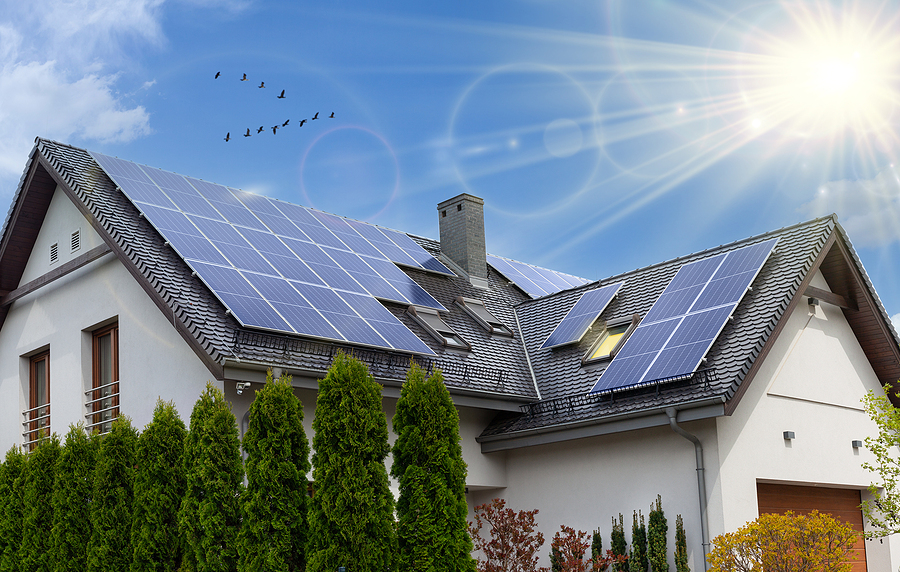Introduction
With global warming and climate change becoming ever more pressing, more people are turning to solar energy as a solution. Solar energy is a renewable, sustainable, and eco-friendly alternative to traditional energy sources such as coal and gas. The use of solar panels for home energy production is becoming increasingly popular, and for good reason.
In this article, we will explore the top 5 ways solar energy can benefit your home, whether an existing home or a new house and land package. From reducing your energy costs to increasing the value of your property, we will cover everything you need to know about the advantages of solar power. We’ll delve into the nitty-gritty of how solar panels work, how they can save you money, and how they can help reduce your carbon footprint.
Reduce Energy Costs
One of the most significant benefits of solar energy for homeowners is its ability to reduce energy costs. With solar panels installed on your roof or property, you can generate electricity, reducing your reliance on the power grid and lowering your monthly energy bills.
Traditional energy sources like fossil fuels are finite resources, and their prices can fluctuate rapidly depending on global markets and geopolitical events. In contrast, solar energy is a renewable and sustainable energy source that is becoming more affordable and accessible yearly. The initial cost of purchasing and installing solar panels can be high, but the long-term savings on energy costs can make it a worthwhile investment.
In addition to the financial benefits, using solar energy to power your home can also help to reduce your carbon footprint and support a cleaner environment. By choosing to go solar, you can actively reduce your household’s environmental impact while reaping the financial rewards of sustainable living.
Environmental Benefits
Besides the economic advantages, solar energy is also an environmentally friendly option. Solar power can significantly reduce your home’s carbon footprint and help preserve the environment.
Reduce Greenhouse Gas Emissions
Solar energy does not produce any harmful emissions or pollutants, unlike traditional energy sources such as coal or natural gas. By using solar power, you can significantly reduce your carbon footprint and contribute to reducing greenhouse gas emissions.
Conserve Natural Resources
Solar energy is renewable and does not deplete natural resources. In contrast, fossil fuels are finite resources that will eventually run out. Solar power can help conserve natural resources and ensure a sustainable future for generations to come.
Reduce Water Usage
Traditional power plants require large amounts of water to generate electricity. In contrast, solar power systems require very little water to operate. By using solar power, you can help conserve water resources and reduce the strain on our freshwater supplies.
Decrease Dependence on Fossil Fuels
Using solar power can reduce your dependence on fossil fuels and help reduce their demand. This can help reduce the negative environmental impact associated with the extraction and transportation of these fuels.
Increase Home Value
Installing solar panels on your home is not only a smart investment for reducing your energy costs and promoting environmental sustainability, but it can also increase the value of your home. As the demand for sustainable and eco-friendly homes continues to rise, homebuyers are willing to pay more for properties equipped with solar panels.
Solar panels installed on your home can also improve its curb appeal. Solar panels give your home a modern and innovative look that can set it apart from other properties on the market. Potential homebuyers may also appreciate the added benefit of having an eco-friendly energy source, saving them time and effort.
It is worth noting that the value of your home will depend on various factors, such as the size of the solar panel system, the age and condition of the panels, and the location of your property. However, solar panels can be a valuable investment for homeowners who want to increase the value of their property while reducing their energy costs and promoting environmental sustainability.
Energy Independence
Another benefit of solar energy is achieving energy independence. With a solar panel system, you can generate electricity and rely less on the grid. This is particularly important in areas where power outages are common due to extreme weather events or other factors.
Choosing solar energy is not just a cost-saving measure, it is also an investment in your future. It can result in significant savings on your energy bills and increase the value of your property while promoting environmental sustainability. Moreover, since solar energy is renewable, you can rely on it as a consistent and long-term power source.
Additionally, with the growing popularity of electric vehicles (EVs), having a solar panel system can provide energy to charge your car. This can save you money on gas and reduce your environmental impact.
Energy independence also provides a sense of security and peace of mind. You don’t have to worry about power outages or rising energy costs because you have a reliable and sustainable energy source in your backyard.
Tax Credits and Incentives
Tax credits and incentives are other significant advantages of solar energy for your home. Installing solar panels can make you eligible for various tax credits and incentives at the federal and state level.

The federal government provides a tax credit for the cost of installing solar panels on your home. This credit is currently available, and homeowners can benefit from it by reducing the overall cost. Some states also offer additional tax credits and incentives, such as property tax exemptions and sales tax exemptions, which can make solar panels more affordable for homeowners.
Apart from tax credits and incentives, some utility companies provide net metering programs that allow homeowners to sell excess energy generated by their solar panels back to the utility company. This can significantly reduce monthly energy bills and even result in credits or payments from the utility company. The details of net metering programs may vary by state and utility company, but they offer homeowners an opportunity to save money while generating electricity.
Conclusion
Solar energy is an innovative and sustainable solution for homeowners looking to reduce their energy costs, increase their property value, and help protect the environment. With the numerous benefits solar energy offers, including energy independence, environmental friendliness, and the potential for tax credits and incentives, there has never been a better time to invest in solar panels for your home. Not only will you save money on your energy bills, but you’ll also be positively impacting the planet. So, take the leap and switch to solar energy – your wallet and the earth will thank you.
Image Source: BigStockPhoto.com (Licensed)
Related Categories: Home, Environmental, Reviews






